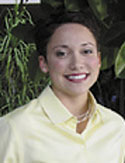 |
|
Jenny Rimsza
Former ASA director
|
|
By Daniel Scarpinato
Arizona Daily Wildcat
Monday October 21, 2002
Jenny Rimsza, the student government appointee who lobbied at the state capital last year for more state ╬funding' and lower tuition formally resigned from her post on Friday, claiming she was robbed of her freedom to vote her conscience on student issues.
Rimsza's resignation came on the heels of a new operational style instituted by student body President Doug Hartz for how local Arizona Students' Association delegates, including Rimsza, would vote at statewide meetings.
Under Hartz's terms, ASA's directors must vote unilaterally on issues deemed "detrimental to the university" or abstain from voting all together, unless they have sufficient reason for voting otherwise.
On Friday, Rimsza delivered to Hartz her letter of resignation, a protest to an executive decision that she saw as "micromanagement."
The directors and student body presidents from Arizona's three universities vote at ASA delegate meetings, often coupled with the timing of Arizona Board of Regents meetings.
At September's meeting, Rimsza voted contrary to Hartz on an internal ASA issue.
Still, her resignation was voluntary, since Hartz was willing to let the upset slide, they both said.
Rimsza called the changed in operation "a verbal rule" that was never put in writing, while Hartz said the terms "rule," "policy" and "procedure" are misleading because the executive authority was already in the ASA bylaws and the ASUA Constitution.
Hartz also said that Rimsza resigned without ever asking for a policy change.
He said that he sat down with his executive board in June and fleshed out the administration's procedure for deciding how delegates would vote at statewide meetings.
In August, Hartz spoke with the three ASA directors, with Rimsza on teleconference from New Jersey, and explained that ASA would make a conscious effort to present a "unified front" on issues.
Hartz asked for input, and none of the directors, including Rimsza voiced concern, he said.
But Rimsza argues that when push came to shove not every issue was thoroughly discussed.
"There were a million and one other issues," she said in reference to the issues under consideration in the September meeting. "If you are going to have a rule like this, you have to sit down and come to a clear consensus."
Hartz maintains that as the chief spokesperson for student government and ASA, he had the responsibility and authority to act in the best interest of the student body and the university.
ASA bylaws state that the UA student body president serves as the local director of ASA and he or she may appoint three other directors and designate their rank.
Article 3, section 3, of the ASUA of Arizona Constitution states that the president has authority to supervise all meetings of the directors.
"Appointed people are there to assist those who have been elected," Hartz said. "Working in this office is not a right, it's a privilege."
He added that ASUA, of which ASA is a component, is a not-for-profit business, not a government.
"The right to vote is not an issue," he said. "It does not compare to your right to vote in an election."
For student government, losing Rimsza means the loss of an experienced student lobbyist, who spent last year working closely with then-student body president Ray Quintero on several fronts.
Rimsza, who was recently named Fiesta Bowl Queen, worked on grass roots movements including the "no more than 4" campaign, which sought to quell state budget cuts, ASA's "zero percent" tuition increase stance and a voter-registration drive that ended this month.
She renewed her post on ASA under Hartz, this time with a seat on the Faculty Senate and in a campus climate different then last year's with the unveiling of university President Pete Likins' "Focused Excellence" plan.
"I'm concerned with the loss of a director with experience," Hartz said, adding that ASA will fill Rimsza's vacant position.
Quintero said that last year, Rimsza "performed her role well under the guidelines set down for her."
Former ASA co-director Denny Marta, who worked with Rimsza last year, was surprised to hear about her resignation.
"Jenny was an integral part of the organization," he said. "She was definitely the glue that held us together."
He also noted that Quintero encouraged the directors to vote independently last year, although they usually voted similarly on issues.
Hartz said there were "inconsistencies" in Rimsza's performance this semester, but would not elaborate and maintained that her resignation was tied only to the voting procedure disagreement.
The two other student lobbyists, Melaine Rainer and Ryan Patterson, are former ASUA Club Advocates and were already planning on undertaking the bulk of ASA's lobbying efforts while Rimsza concerned herself with other lobbying projects, Rainer said.
"Ryan and I have been just as well trained," she said.
Applicants are being accepted for the position, Rainer said, and Hartz added that one of ASA's three directors will take Rimsza's seat on the Faculty Senate.
"While I'm really upset, I'm so much happier that I don't have to be in a situation were I don't have the freedom to vote how I want to vote," Rimsza said.
"Doug is a great guy, but I look at it this way: If Doug was not a guy that people like, then they would be up in arms over this."
Hartz, who spoke about ASA frequently during his run for president, said he is heavily involved in this year's lobbying efforts.
"A lot of things are going to happen that are going to influence how we look at tuition," he said. "What we're trying to look at now are students' needs, financial aid, and how important it is for people to retain tenured faculty."

